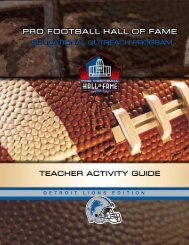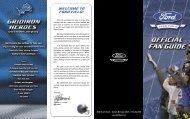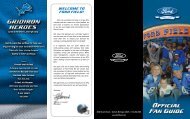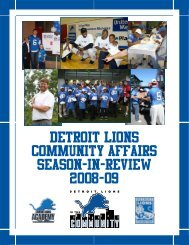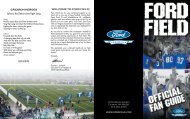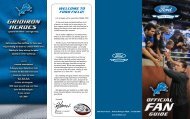PRESEASON EditiON - Detroit Lions
PRESEASON EditiON - Detroit Lions
PRESEASON EditiON - Detroit Lions
Create successful ePaper yourself
Turn your PDF publications into a flip-book with our unique Google optimized e-Paper software.
exeCutives & CoaChing<br />
<strong>Detroit</strong>lions.com<br />
Media.<strong>Detroit</strong>lions.com<br />
<strong>Lions</strong> to win a Super Bowl. Mr. Ford understands that with competitive<br />
realities of today’s NFL, reaching the game’s pinnacle takes a<br />
concerted organizational effort both on and off the field. While<br />
everyone appreciates the importance of the coaching staff and the<br />
front office staff, you also need the proper infrastructure, such as<br />
state-of-the-art stadium and practice facilities.<br />
Mr. Ford’s commitment was evident in the <strong>Lions</strong>’ return “home” to<br />
a new downtown <strong>Detroit</strong> stadium, Ford Field, in 2002. The $500 million<br />
stadium enhanced the <strong>Lions</strong>’ ability to compete in several facets of<br />
the game. In this NFL age, the revenues produced from Ford Field help<br />
level the economic playing field with the <strong>Lions</strong>’ NFL counterparts.<br />
The Ford Family and Ford Field were the overwhelming factors<br />
in <strong>Detroit</strong> being awarded the right to host Super Bowl xL in February<br />
2006. That championship game clearly added to the city’s economic<br />
landscape in numerous ways, including a $260 million boost to Metro<br />
<strong>Detroit</strong>, and the impact the Ford family had on bringing the Super Bowl<br />
to <strong>Detroit</strong> was apparent.<br />
“We wouldn’t be here if it were not for the Ford family, who led<br />
the way in developing Ford Field as a catalyst for the redevelopment<br />
of downtown <strong>Detroit</strong>, including the return of the Super Bowl to<br />
<strong>Detroit</strong>,” former NFL Commissioner Paul Tagliabue pronounced in<br />
2006 during his annual state of the league press conference held just<br />
prior to Super Bowl xL.<br />
“And the Ford family’s leadership has certainly been a big part,<br />
not just of the NFL and NFL history, but of <strong>Detroit</strong> and our nation’s<br />
history.”<br />
Ford Field has been a key cog in shaping further revitalized growth<br />
for the city of <strong>Detroit</strong>. The stadium’s effect on the city continues to<br />
be comprehensive with its contributions as it hosts several events<br />
besides <strong>Lions</strong>’ games.<br />
In May 2003, the <strong>Detroit</strong> News honored Mr. Ford as a Michiganianof-the-Year,<br />
an annual tribute to select citizens who made significant<br />
contributions to the state or local community, as he had brought the<br />
<strong>Lions</strong> “back home” and opened Ford Field’s doors to reap benefits<br />
for <strong>Detroit</strong>. In September 2005, he was inducted into the Michigan<br />
Sports Hall of Fame.<br />
Additional confirmation of his steadfast dedication to the team<br />
was the completion of the team’s $36 million Headquarters and<br />
Training Facility in Allen Park, Mich., that opened in April 2002 as the<br />
NFL’s premier training center.<br />
Thanks to Mr. Ford’s addition of the <strong>Lions</strong> Headquarters and<br />
Training Facility, the entire organization develops year-round in a<br />
world-class environment. Both the short-term and long-term impacts<br />
are significant as the team trains under conditions second-to-none.<br />
This joint venture between the <strong>Lions</strong> and Ford Land Development<br />
Corporation provides state-of-the-art facilities for players’ off-season<br />
workouts, training camp, and in-season meetings and practices.<br />
Throughout his tenure as owner, William Clay Ford has guided<br />
the <strong>Detroit</strong> <strong>Lions</strong> organization with a sense of balance, integrity and<br />
honest leadership. Never one to seek the limelight, Mr. Ford has not<br />
sought public accolades for his many contributions to football, the<br />
automotive industry and his community.<br />
Known as Bill Ford to his friends and business associates, his<br />
relationship with the <strong>Lions</strong> began during his childhood when his father,<br />
Edsel Ford, took him to the University of <strong>Detroit</strong> Stadium to see the<br />
first <strong>Lions</strong> team play in their maiden season in the Motor City in 1934.<br />
He became a club director in 1956 and was asked by then-<strong>Lions</strong>’<br />
President Edwin J. (Andy) Anderson to become the <strong>Lions</strong>’ president<br />
in 1961.<br />
In November 1963, Mr. Ford purchased the team outright for $4.5<br />
million and officially took over the club January 10, 1964. The 2012<br />
season will mark the 49th year of Mr. Ford’s sole ownership of the club.<br />
Of course, Mr. Ford’s other passion in life is the automotive<br />
industry, he being the only surviving grandson of inventor and auto<br />
pioneer Henry Ford, founder of the Ford Motor Company.<br />
For the entire Ford family, 2003 marked a year of great pride and<br />
celebration as Ford Motor Company commemorated its historic 100<br />
years as an icon in American industry.<br />
In May 2005, Mr. Ford retired from the Board of Directors of Ford<br />
Motor Company after nearly 57 years of service. He remains director<br />
emeritus on the Board of Directors. Mr. Ford most recently served as<br />
a member of the Board of Directors and was on the company’s Finance<br />
Committee, and in years past served on its Governance Committee.<br />
He had been a board member since 1948 and was chairman of the<br />
company’s Design Committee from its inception in 1957 until his<br />
retirement as vice chairman in March 1989.<br />
Utilizing his expertise in design, Mr. Ford was also on special<br />
assignment as a design consultant focusing on the Jaguar.<br />
During his career with the company, Mr. Ford gained special<br />
satisfaction and acclaim as the executive in charge of the design,<br />
development and subsequent introduction of the Continental Mark<br />
II, the successor to the classic Lincoln Continental that had been<br />
developed and introduced by his father Edsel in 1939. In 1973, Mr.<br />
Ford was appointed vice president-Product Design.<br />
Mr. Ford was elected to the Board of Directors in 1948 and began<br />
his employment at Ford following graduation from Yale University.<br />
He served several executive positions before appointment as vice<br />
president and general manager of the Continental Division in 1954.<br />
In 1956, he assumed responsibility for corporate product planning<br />
and design.<br />
When the Design Committee of Ford’s Policy and Strategy<br />
Committee was formed in 1957, Mr. Ford became the committee’s<br />
first chairman, a post he held until retirement in 1989.<br />
In 1978, Mr. Ford was elected chairman of the Executive Committee<br />
and appointed a member of the Office of the Chief Executive. He<br />
was elected vice chairman of the Board in 1980 and chairman of the<br />
Finance Committee in 1987. He retired as chairman of the Finance<br />
Committee in 1995.<br />
The youngest of Edsel’s four children, William Clay Ford was born<br />
March 14, 1925. Following a tour of duty with the U.S. Naval Air Corp<br />
in World War II, he enrolled at Yale, where he lettered in both tennis<br />
and soccer at the Ivy League school. As a collegian, he won league<br />
tennis titles in singles and doubles, and he earned All-American<br />
honorable mention honors in soccer. In fact, he was a nationally-ranked<br />
tennis player until two Achilles tendon surgeries relegated him to the<br />
sidelines. Mr. Ford’s athletic participation today includes golf, a game<br />
in which he became nearly a scratch performer, while registering a<br />
remarkable seven (7) holes-in-one over the years.<br />
He graduated from Yale with a bachelor of science degree in<br />
economics and then joined Ford’s sales and advertising staff. He<br />
later served on the industrial relations staff where he was a member<br />
of the committee that negotiated the historic 1949 contract with<br />
the UAW-CIO.<br />
Mr. Ford also is chairman emeritus of the Board of Trustees of The<br />
Henry Ford. He is an honorary life trustee of the Eisenhower Medical<br />
Center, is a national trustee for the Boys’ and Girls’ Clubs of America<br />
and honorary chair of the United Way Community Services. He is<br />
also on the Texas Heart Institute National Advisory Council. Mr. Ford<br />
received an honorary doctor of science degree from the Art Center<br />
College of Design in Pasadena, Calif., in 1981.<br />
Mr. Ford’s generosity as a benefactor was again recognized in<br />
1997, as the outdoor courts of the University of Michigan’s new tennis<br />
center were named in his honor. Also, a new addition to <strong>Detroit</strong>’s<br />
Henry Ford Hospital (which bears the name of Mr. Ford’s grandfather)<br />
opened in 1996 - The William Clay Ford Center for Athletic Medicine<br />
- which is one of the leading sports medicine treatment and research<br />
institutions in the country.<br />
He is married to the former Martha Firestone of Akron, Ohio.<br />
They are the parents of three daughters— Martha, Sheila and<br />
Elizabeth— and a son, William Clay Ford, Jr., who serves as the<br />
<strong>Lions</strong> Vice Chairman, in addition to his role as Executive Chairman<br />
of Ford Motor Company.



